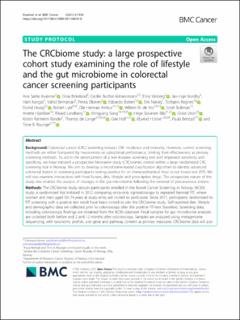| dc.contributor.author | Kværner, Ane Sørlie | |
| dc.contributor.author | Birkeland, Einar Elvbakken | |
| dc.contributor.author | Bucher-Johannessen, Cecilie | |
| dc.contributor.author | Vinberg, Elina | |
| dc.contributor.author | Nordby, Jan Inge | |
| dc.contributor.author | Kangas, Harri | |
| dc.contributor.author | Bemanian, Vahid | |
| dc.contributor.author | Ellonen, Pekka | |
| dc.contributor.author | Botteri, Edoardo | |
| dc.contributor.author | Natvig, Erik | |
| dc.contributor.author | Rognes, Torbjørn | |
| dc.contributor.author | Hovig, Eivind | |
| dc.contributor.author | Lyle, Robert | |
| dc.contributor.author | Ambur, Ole Herman | |
| dc.contributor.author | de Vos, Willem M. | |
| dc.contributor.author | Bultman, Scott J | |
| dc.contributor.author | Hjartåker, Anette | |
| dc.contributor.author | Landberg, Rikard | |
| dc.contributor.author | Song, Mingyang | |
| dc.contributor.author | Blix, Hege Salvesen | |
| dc.contributor.author | Ursin, Giske | |
| dc.contributor.author | Randel, Kristin Ranheim | |
| dc.contributor.author | de Lange, Thomas | |
| dc.contributor.author | Hoff, Geir | |
| dc.contributor.author | Holme, Øyvind | |
| dc.contributor.author | Berstad, Paula | |
| dc.contributor.author | Rounge, Trine Ballestad | |
| dc.date.accessioned | 2021-10-07T07:37:15Z | |
| dc.date.available | 2021-10-07T07:37:15Z | |
| dc.date.created | 2021-08-20T14:20:38Z | |
| dc.date.issued | 2021-08-18 | |
| dc.identifier.citation | BMC Cancer. 2021, 21 . | en_US |
| dc.identifier.issn | 1471-2407 | |
| dc.identifier.uri | https://hdl.handle.net/11250/2788286 | |
| dc.description.abstract | Background: Colorectal cancer (CRC) screening reduces CRC incidence and mortality. However, current screening methods are either hampered by invasiveness or suboptimal performance, limiting their effectiveness as primary screening methods. To aid in the development of a non-invasive screening test with improved sensitivity and specificity, we have initiated a prospective biomarker study (CRCbiome), nested within a large randomized CRC screening trial in Norway. We aim to develop a microbiome-based classification algorithm to identify advanced colorectal lesions in screening participants testing positive for an immunochemical fecal occult blood test (FIT). We will also examine interactions with host factors, diet, lifestyle and prescription drugs. The prospective nature of the study also enables the analysis of changes in the gut microbiome following the removal of precancerous lesions. Methods: The CRCbiome study recruits participants enrolled in the Bowel Cancer Screening in Norway (BCSN) study, a randomized trial initiated in 2012 comparing once-only sigmoidoscopy to repeated biennial FIT, where women and men aged 50–74 years at study entry are invited to participate. Since 2017, participants randomized to FIT screening with a positive test result have been invited to join the CRCbiome study. Self-reported diet, lifestyle and demographic data are collected prior to colonoscopy after the positive FIT-test (baseline). Screening data, including colonoscopy findings are obtained from the BCSN database. Fecal samples for gut microbiome analyses are collected both before and 2 and 12 months after colonoscopy. Samples are analyzed using metagenome sequencing, with taxonomy profiles, and gene and pathway content as primary measures. CRCbiome data will also be linked to national registries to obtain information on prescription histories and cancer relevant outcomes occurring during the 10 year follow-up period. Discussion: The CRCbiome study will increase our understanding of how the gut microbiome, in combination with lifestyle and environmental factors, influences the early stages of colorectal carcinogenesis. This knowledge will be crucial to develop microbiome-based screening tools for CRC. By evaluating biomarker performance in a screening setting, using samples from the target population, the generalizability of the findings to future screening cohorts is likely to be high. | en_US |
| dc.description.sponsorship | Funding for this project was provided by the Norwegian Cancer Society, the Research Council of Norway and the South Eastern Norway Regional Health Authority. | en_US |
| dc.language.iso | eng | en_US |
| dc.publisher | BMC | en_US |
| dc.relation.ispartofseries | BMC Cancer;21, Article number: 930 (2021) | |
| dc.rights | Navngivelse 4.0 Internasjonal | * |
| dc.rights.uri | http://creativecommons.org/licenses/by/4.0/deed.no | * |
| dc.subject | Diets | en_US |
| dc.subject | Lifestyles | en_US |
| dc.subject | Prescription drugs | en_US |
| dc.subject | Gut microbiomes | en_US |
| dc.subject | Metagenomics sequencing | en_US |
| dc.subject | Fecal occult blood tests | en_US |
| dc.subject | Colonoscopy | en_US |
| dc.title | The CRCbiome study: a large prospective cohort study examining the role of lifestyle and the gut microbiome in colorectal cancer screening participants | en_US |
| dc.type | Peer reviewed | en_US |
| dc.type | Journal article | en_US |
| dc.description.version | publishedVersion | en_US |
| dc.rights.holder | © The Author(s). 2021 | en_US |
| dc.source.articlenumber | 930 | en_US |
| cristin.ispublished | true | |
| cristin.fulltext | original | |
| cristin.qualitycode | 1 | |
| dc.identifier.doi | https://doi.org/10.1186/s12885-021-08640-8 | |
| dc.identifier.cristin | 1927708 | |
| dc.source.journal | BMC Cancer | en_US |
| dc.source.volume | 21 | en_US |
| dc.source.pagenumber | 14 | en_US |

